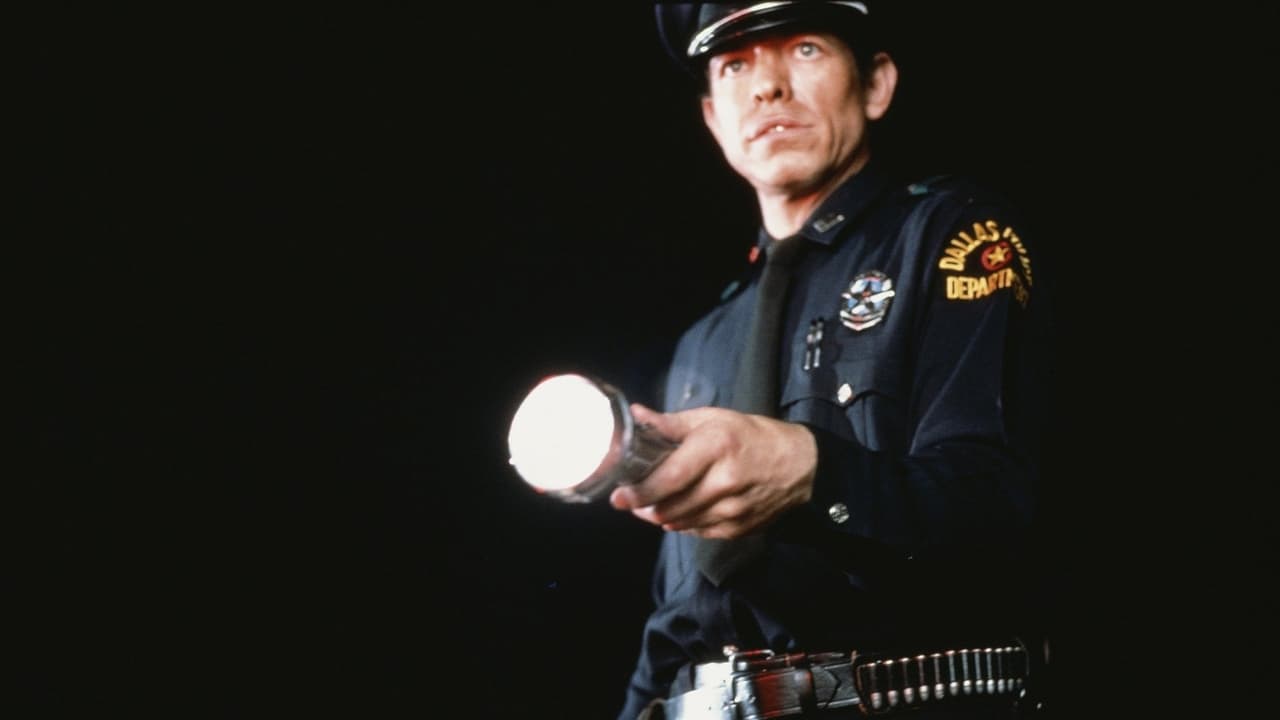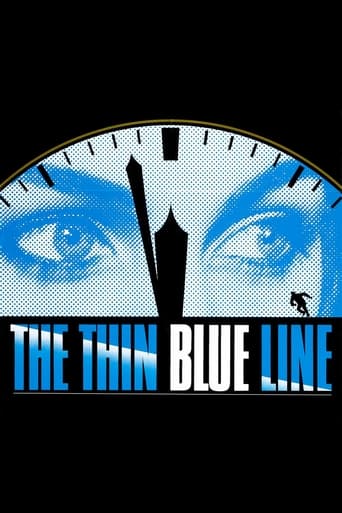

This Movie Can Only Be Described With One Word.
... View MorePeople are voting emotionally.
... View MoreNice effects though.
... View MoreI cannot think of one single thing that I would change about this film. The acting is incomparable, the directing deft, and the writing poignantly brilliant.
... View MoreAn excellent documentary, "The Thin Blue Line" presents the murder of a Dallas police officer, and the resulting conviction of his supposed killer - "supposed" being a *nice* way of putting it. There was no evidence, and the eyewitnesses that Dallas PD relied on were farcical. Randall Adams was subjected to police intimidation, a laughable trial and twelve years in prison. The details of the case are enough to wish shame on the system, yet this is one of the most fascinating documentaries I've seen in forever. There's a hypnotic quality to this film, from Philip Glass' melancholy score to Errol Morris' expert use of imagery - an overturned Burger King cup, the Ben-Day dots of a zoomed-in newspaper photograph - simple and mundane visuals, perfectly stages for maximum impact. I found myself getting lost in the film's aesthetic, even as one talking head after another offers realistic testimony. If I didn't know that this film had an effect on the case, then it'd remain a monumental tragedy of injustice. It's horrible that an officer had to lose his life in a senseless act, but at least the wrong guy isn't being punished.8/10
... View MoreDocumentary has never and can never be an objectively reproduction of reality, yet it is an expectation of the genre nonetheless. There have been many attempts in the past to achieve this goal: pure cinema, shooting in the verite style, observational modes, or even exhibitions such as Andy Warhol's Empire, an eight hour unbroken shot of the Empire State Building. But even the decision to begin shooting is an artistic choice in itself, which can reveal anything from the composer's ideology to their worldview and values. The form is fraught with many manipulations - how to edit footage or to even edit at all, how to hold the camera, the length of shooting, what to capture, and so on. Documentary has never been about transferring reality onto film, but rather representing a distinct point of view, a social purpose, a message. With The Thin Blue Line, Errol Morris breathed new life and new controversy into the genre. Harvey Weinstein fiddled with its marketing, attempting to sell it as a murder mystery thriller and inviting the audience to participate in the solving of the case. The Academy was not entirely convinced of its origins. Morris' re-enactments of the night of the crime verge on expressionism; noirish blacks, coiling smoke and fog, red sirens pulsing alongside a Phillip Glass soundtrack that churns ominously and urgently as if in anticipation of the impending bloodshed. His closeups render a popcorn maker into majestic machinery, and draw close scrutiny to what should be an innocuous detail. Did the officer drop the milkshake onto the ground? Or was it safe and sound in the cupholder? Morris continually intercuts between objectivity and subjectivity, throwing up a barrage of inserts of statistics, police reports and newspaper articles which cannot be wrong. Then there is the heightened re-enactment, the literal smoking gun thrust into the frame, forcing us to contend with what Robert Wood saw in the last moments of his life. How can we trust what the talking heads are saying without the little captions that always accompany their first appearance, introducing their title and role? How can we be sure of their honesty and truthfulness if we cannot hear Morris' questions in voice-over? Morris blows up factual details with extreme closeups, and slows down moments like the milkshake hitting the floor or the gun under the seat, as if to scrutinise their actual existence. He flashes anecdotal recounts of the night from his interviewees, then juxtaposes their clarity with trails of thought that fumble around for the truth. Was there one person in the car, or two? Did the driver have sandy-blonde hair, or bushy hair? There can be no objective truth when an event is reconstructed from hazy recollections and memories - Morris is merely mimicking this process. He never claims to represent the absolute truth, but through piecing bits of evidence together, assembles an alternate story that points to an alarming injustice. Morris' interview process would later lead to his development of the Interrotron, first used in Fast Cheap and Out of Control. The device, a similar to a teleprompter, allows the camera to capture the direct gaze of the subject whilst maintaining the intimacy of a one-on-one interview. Randall Dale Adams, in his prison whites, looks directly into our eyes. We meet the cold gaze of the psychopath David Harris, who freely admits to the crime. There is no doubting that they are addressing us, that they believe in the words that come from their mouths, even when they are lying. Would the final scene be half as chilling if Morris' camera had not coincidentally broken on the day, forcing him to record only the dialogue of Harris' fateful confession? Perhaps not, but it is how that version of the events has been presented to us, and we must evaluate what we see (or hear). We assemble our reality from the details we are given, yet sometimes a conclusion is forced from puzzle pieces that do not match. That is how the prosecutors saw it, that they could convict an adult in Adams but not the adolescent perpetrator. In The Thin Blue Line, Morris is chopping up the documentary form. He is rearranging and shifting the pieces to create something resembling the truth, but do we ever hear an outright declaration of the innocence of Adams, or the guilt of Harris? No, because to do so would be as dishonest as the prosecution all those years ago. He merely shows the wrongs and falsities of the testimonies for what they are - that is the power of film.
... View MoreIn 1976, Dallas police officer Robert W Wood was killed during a traffic stop. His partner was one of the first female police officers in Dallas. The car was stolen and she had problems recalling the event. Randall Dale Adams was eventually convicted for the crime. David Ray Harris had bragged about the killing but later claimed that it was Randall who killed the cop. David had picked up Randall hitchhiking and spend the day together. While Randall claimed to be with his brother, David claimed that he was with Randall who shot the cop.This is a breakthrough Errol Morris documentary. The case itself is interesting and the fact that it actually helped overturn the case is impressive. There is a hypnotic beauty to the reenactments along with the Philip Glass music. The movie does take a little while to lay down the incident. I think a more straight forward recitation of the main facts of the case with narration at the beginning would be better. This is a ground breaking documentary.
... View MoreThis is a timeless classic in every sense. How long have there been innocent people accused and punished for crimes at the hands of shallow people for shallow purposes? What an excellent review and indictment of the legal system of Texas, of which I am a resident, and the legal system in general.A dude gets into a car with a psychopath and his life is changed forever. The story is well known by now-if not by this documentary, then by countless others.I would believe that the person responsible for this expose is intimately familiar with the concept of false accusations. The horror illustrated herein is magnified by the factor that the state of Texas (or any other state) is willing to buy into any cheap lie or sideshow which lends convenience to the apparatus responsible for obtaining a conviction, whatever the cost.As one who has been falsely accused, I was riveted. If I only had the talent and resources of this author.
... View More